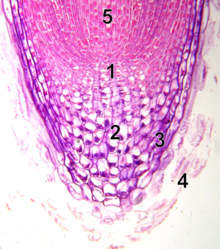Root cap

The root cap is a type of tissue at the tip of a plant root.[1] It is also called calyptra. Root caps contain statocytes which are involved in gravity perception in plants.[1] If the cap is carefully removed the root will grow randomly. The root cap protects the growing tip in plants.[1] It secretes mucilage to ease the movement of the root through soil,[1] and may also be involved in communication with the soil microbiota.[1]
The purpose of the root cap is to enable downward growth of the root, with the root cap covering the sensitive tissue in the root.[2] Thanks to the presence of statocytes, the root cap enables geoperception or gravitropism. This allows the plant to grow downwards (with gravity) or upwards (against gravity).[3]
The root cap is absent in some parasitic plants[4]: 138 and some aquatic plants, in which a sac-like structure called the root pocket may form instead.[5]: 2–76
References
- ^ a b c d e Raven, J.A.; Edwards, D. (2001). "Roots: evolutionary origins and biogeochemical significance". Journal of Experimental Botany. 52 (90001): 381–401. doi:10.1093/jexbot/52.suppl_1.381. PMID 11326045.
- ^ Burgess, Jeremy (1985-05-16). Introduction to Plant Cell Development. CUP Archive. ISBN 9780521316118.
- ^ Kuya, Noriyuki; Sato, Seiichi (2011). "The relationship between profiles of plagiogravitropism and morphometry of columella cells during the development of lateral roots of Vigna angularis". Advances in Space Research. 47 (3): 553–562. Bibcode:2011AdSpR..47..553K. doi:10.1016/j.asr.2010.09.009.
- ^ Jeffrey, Edward Charles (2007). The Anatomy of Woody Plants. Pomeroy, Ohio: Carpenter Press. ISBN 978-1-4067-1634-4.
- ^ Gupta, P.K. (2007). Genetics: Classical to Modern. Rastogi Publications. ISBN 978-8-1713-3896-2.
